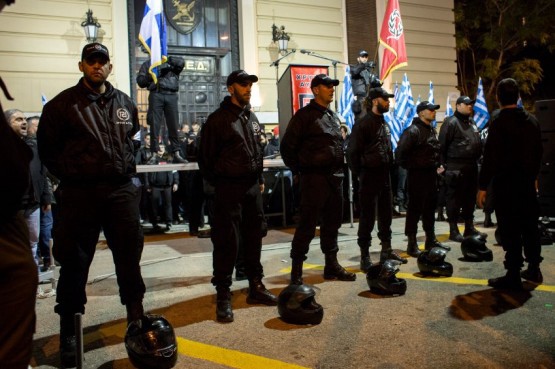
The Greek government is taking emergency steps to consider banning a prominent ultra-national party — that holds seats within the legislative body — after a man registered with the party brazenly stabbed an anti-fascist musician to death in public on Wednesday.
In the face of Greece’s economic problems, the far-right party known as Golden Dawn has managed to gain prominence through speaking to citizens’ concerns about the European Union-imposed austerity and cast the blame on the left-wing and immigrants. That message propelled them from the fringes to taking 18 seats in the 300 seat Greek parliament in elections last year, despite being labeled a neo-Nazi group. Since then, they’ve used their new clout to take increasingly provocative actions, including engaging in clashes with the Greek Communist party and holding a “Greeks only” food handout while blaring the anthem of Nazi Germany.
Those provocations boiled over on Wednesday when anti-fascist rapper Pavlos Fyssas, who went by the stage name Killa P, was stabbed to death in public. According to the Guardian, Fyass was stabbed in the chest after he and seven friends were surrounded by 30 supporters of Golden Dawn. Witnesses say that the alleged stabber, who later confessed to police that he is a registered member of Golden Dawn, arrived in a car after members of the mob placed a phone call to him. His wife, who was also detained, told police that she had attempted to obscure evidence — including his party affiliation — after the murder. Golden Dawn has officially said that it was not involved in the murder, but that didn’t stop police from raiding their offices on Wednesday.
In response to Fyssas’ death, the Greek government is tabling emergency legislation that would re-evaluate what counts as a criminal gang. “Neither the state will tolerate, nor society accept, acts and practices that undermine the legal system,” Public Order Minister Nikos Dendias told reporters, adding that the attack showed “in the clearest way [Golden Dawn’s] intentions.” In a national TV address, Greek Prime Minister Antonis Samaras told his countrymen, “This government is determined not to let the descendants of the Nazis poison our social life or commit crimes.”
Previously, Golden Dawn’s members have mostly focused their rage on immigrants, disparaging them as “parasites [who] drink our water, eat our food and breathe our Greek air.” Those words were spoken by Alekos Plomaritis, who was a Golden Dawn candidate running for office when Greek filmmaker Konstaninos Georgousis captured them on film. “They are primitive, miasmas and subhuman. We don’t care about their existence. We are ready to open the ovens. We will turn them into soap, but we may get a rash.”
Greece’s immigrant community has had little support to date, however, in fighting back against Golden Dawn. After last year’s electoral victory, supporters of the party upped their levels of intimidation with little response from the police, who according to reports have strong ties with the party. “They said: ‘You’re the cause of Greece’s problems. You have seven days to close or we’ll burn your shop — and we’ll burn you,’ ” Mohammed Irfan, a legal Pakistani immigrant who owns a hair salon and two other stores, told the New York Times last July. “When he called the police for help, he said, the officer who answered said they did not have time to come to the aid of immigrants like him,” the Times report went on to say.
What remains to be seen is how Fyssas’ killing, the most significant action Golden Dawn supporters have taken against a Greek national, will play out in the polls. In recent weeks, Golden Dawn has polled highly enough to be considered the third most-powerful party in all of Greece, behind only the far-left main opposition party and the center-right ruling coalition — a position that may increase after local elections are held in 2014.
